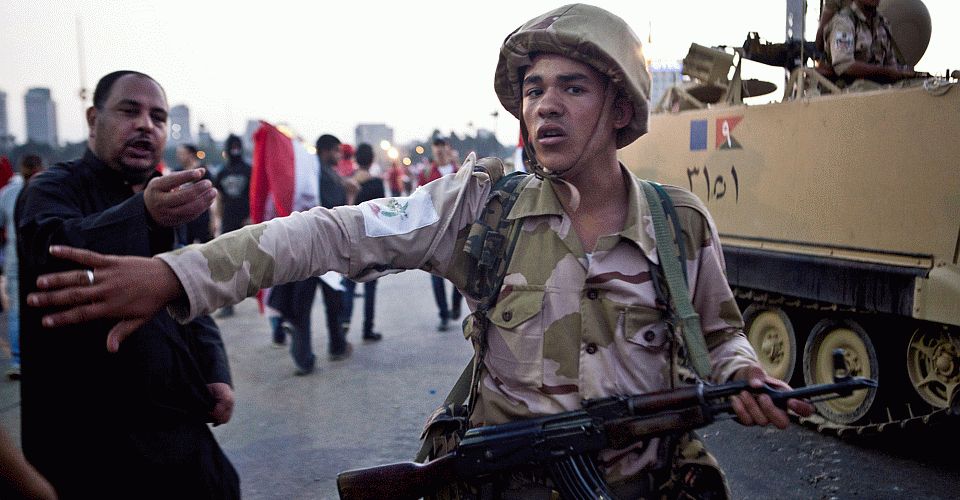2013: the year the Arab Spring died
In the Egyptian coup, democratic hopes were snuffed out.

Back in February 2011, as angry crowds thronged Tahrir Square in Cairo, calling for President Hosni Mubarak to call time on his 30 years of military dictatorship, Western political leaders, accompanied by an assortment of the nominally liberal and sort-of leftish, could barely contain their democratic urges. This wasn’t just the Arab Spring, it was Western politicos’ spring, too. In the jubilant overthrow of decrepit, hair-dyed tyrants, they saw a chance to pose as champions of democracy.
As Mubarak stumbled from power, American president Barack Obama beamed: ‘Egypt has changed, and its future is in the hands of the people. Those who have exercised their right to peaceful assembly represent the greatness of the Egyptian people.’ The European Union’s foreign-affairs chief, Baroness Catherine Ashton, was similarly quick to pen her message of support. ‘I have called on the Egyptian authorities to embark on a transition towards genuine democratic reform, paving the way for free and fair elections’, she wrote in the Guardian. ‘The challenge is to lay down the roots of deep democracy; there, too, the EU stands ready to help.’ Even Mubarak’s mate, the ex-British prime minister, Tony Blair, was prepared to admit that ‘this is a moment of huge opportunity, and not just for Egypt’.
Pundits from the left side of the tracks were also eager to issue their undying approval of the Spring-time Arabs. A New York Times columnist wrote that ‘democracy is good for Arabs as it is for Israelis and Americans’. In the Observer, an op-ed began: ‘It must be bliss to be alive, young and Arab in this dawn of revolution.’ Laurie Penny, the faddish embodiment of middle-class leftism, enthusiastically proclaimed her solidarity with protesters in Tahrir Square. The difference between protesters overthrowing degenerate despots in the Middle East and 150 anti-cuts protesters stood outside Camden Council offices on Euston Road ‘is one of scale, not of substance’, she waxed.
But in June 2012, something terrible happened – at least in the eyes of Western politicians and pundits. The Egyptians, enjoying the freedom to vote in the first free presidential election in Egypt’s history, did something wrong. They voted for the wrong candidate, the one the West wasn’t keen on. The election of Mohamed Morsi of the conservative Muslim Brotherhood, with 52 per cent of the vote, was too much for those in the West who, just 16 months earlier, had been the biggest cheerleaders of democracy. The Arab Spring was no longer to their liking; democracy was not yielding the right results.
Yet the downbeat reaction to Morsi’s election was nothing compared with what happened in July this year. After days of anti-Morsi protests in Tahrir Square attacking the president for his Islamism and his economic failures, the army moved in and deposed Morsi. Morsi supporters launched counter protests, but they were crushed by the military. As it stands, hundreds of Morsi supporters have been beaten, tortured and killed, and Morsi now faces conspiracy charges and, if found guilty, he could be executed.
And what of those great champions of democracy in the West? How did they respond to this brutal coup d’état, this tank-backed stifling of incipient democracy in a nation that had only just rid itself of its previous military overlord? Outrage? Condemnation? Proclamations of solidarity from outside Camden Council offices?
No – they responded with either explicit approval or a silence that spoke volumes. If anything reveals how shallow were the Spring-praising espousals of democracy and freedom from Western leaders and media cheerleaders, it was the response to the military coup in Egypt.
In fact, Western leaders couldn’t even bring themselves to call the military overthrow of a democratically elected representative what it was, namely ‘a coup’. The US secretary of state, John Kerry, even indulged in a bit of Orwellian doublethink, calling General al-Sisi’s military government a regime for ‘restoring democracy’. Baroness Ashton showed what she meant in 2011 when she said that the EU would help Egypt on the road to ‘deep democracy’ by meeting with al-Sisi and praising him for continuing on the ‘journey [towards] a stable, prosperous and democratic Egypt’. Likewise, Blair seemed quite happy with the bloody coup, saying, ‘I am a strong supporter of democracy, but democratic government doesn’t on its own mean effective government’.
The commentariat, likewise, sent plaudits the Egyptian military’s way. Laurie Penny tweeted that ‘the Egyptian people have brought down Morsi’, and the New York Times columnist David Brooks backed the coup, pointing out that Morsi’s election shows the Egyptian people ‘lack the mental equipment to govern’.
In 2013, the hole at the heart of the Arab Spring, the vacuum where there needed to be ideas and strategy, brought the societies involved to various states of impasse. But 2013 was also the year that those ever-so-virtuous Western politicians and pundits, prompting and pushing affairs from without, stood exposed for the opportunistic enemies of freedom that they are. The Egyptian military may be directly responsible for the slaughter in Egypt, but the justification for the slaughter was born and bred in the West.
Tim Black is deputy editor of spiked.
To enquire about republishing spiked’s content, a right to reply or to request a correction, please contact the managing editor, Viv Regan.









Comments
Want to join the conversation?
Only spiked supporters and patrons, who donate regularly to us, can comment on our articles.